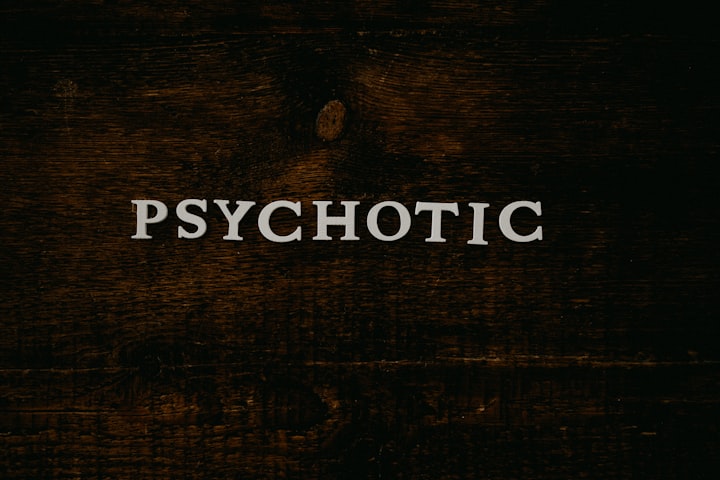Psychosis
Understanding psychosis and it's symptoms

"Psychosis is a condition that affects the way your brain processes information. It causes you to lose touch with reality. People might see, hear, or believe things that aren’t real. Psychosis is a symptom, not an illness" (WebMD Editorial Contributors, 2021). Another way of defining it is - "psychosis is a combination of symptoms resulting in an impaired relationship with reality. It can be a symptom of serious mental health disorders. People who are experiencing psychosis may have either hallucinations or delusions" (Carey, 2018).
A person may struggle to distinguish between what is genuine and what isn't during a psychotic episode because their ideas and perceptions are distorted. Though it is difficult to estimate, 15 to 100 people out of 100,000 are thought to have psychosis annually, according to studies. A psychotic episode can happen to a person at any age, as a symptom of many different diseases and conditions, and it can also happen to an older person. The risk of psychosis, for instance, may be increased among older persons with neurological conditions. Research suggests that individuals between the ages of late adolescence and mid-adulthood.
Symptoms
Someone getting a psychosis doesn't start immediately, it follows a certain pattern, which includes:
Before the psychosis warnings -
- Drop in school grades
- Uneasy around others
- Lack of hygiene
- Spending more of their time alone
- Either no emotions at all or stronger emotions in the situation than called for.
Early signs of psychosis -
- Pulling away from family members
- Not caring about themselves, ending up putting themselves and their bodies at risk.
- Not paying attention to what others say or to their surroundings and not thinking clearly.
- Having beliefs and thoughts about somethings that are not there and hearing, seeing, or tasting things that are not there.
Symptoms of a later stage of psychosis or psychotic episode
There are two different types of psychosis, including: Hallucinations and Delusions. In this area, the symptoms may include all of the above and including:
- Hearing voices when no one is around.
- Unexplainable feelings of sensations on your body or in general.
- Seeing things or people that aren't actually there, or just feel like something is out of shape.
- Outside forces have a lot of control on how you feel or act.
- Small events or meaningful comments are very meaningful.
- You believe that you have powers or are on a special mission.
Causes
The precise etiology of psychosis isn't always known because each case is unique. Some medical conditions can lead to psychosis. Other environmental causes and triggers include drug use, sleep deprivation, and others. Additionally, some circumstances may trigger the development of a certain form of psychosis. Though the exact cause is still unknown, just like most of disorders and mental illnesses. The causes include:
- Genetics
- Trauma
- Substance use or drugs.
- Illnesses or injuries caused to brain.
Treatment
Combining medicine and counseling may be necessary to treat psychosis. Symptoms will often get better with therapy for most people. The fundamental reason will largely determine how psychosis is treated. Often, the only course of action in certain situations is to address the underlying problem. Some of the treatments include:
Psychotherapy
- Cognitive behavioral therapy (CBT) - can aid in identifying psychotic episodes when they occur. Additionally, it aids in determining if what you hear and see is genuine or imagined. The significance of taking antipsychotic drugs and committing to your treatment are also emphasized in this type of therapy.
- Cognitive enhancement therapy (CET) - it aims to enhance social cognition by enhancing perspective-taking, social context evaluation, emotion awareness and management, among other crucial functions. It helps in making the patient with psychosis to be able to assess their surroundings and make sure what is happening and what is not happening in actuality. As they have a hard time in comprehending in what's real and what's not.
- Coordinated specialty care (CSC) - a first episode of psychosis (FEP) is a first appearance of mental illness that affects children, adolescents, and young adults. assembles a treatment team for psychosis when it is initially identified. Social services, employment and education support, medicine, and psychotherapy are all combined by CSC. It aids the individual in lessening psychotic symptoms via the affection and support of close friends and family.
- Family psychoeducation and support - providing them particular coping techniques that they might utilize to control their symptoms. If a client comprehends the purpose and mechanics of a skill when learning coping mechanisms, they are more likely to employ them successfully. However, in particular, this kind of treatment enables services offered to the client's family and other natural supports to rebuild and enhance the client's particular social and familial bonds.
Medication
The most popular form of medicine used to treat psychosis is an antipsychotic, however lithium or antidepressants may also be effective. They improve clarity of thought and lessen hallucinations and delusions. Depending on the symptoms, a doctor will decide what kind of antipsychotic to recommend. Antipsychotics are frequently only needed temporarily, until a person's symptoms can be controlled. Others could require longer-term treatment.
Summary
The term "psychosis" is often and wrongly used to denote a variety of mental health disorders or problems. The term "psychosis" is used correctly to describe a group of symptoms that occur when a person loses touch with reality, including hallucinations and delusions.
Numerous illnesses, including infections, injuries, and mental health issues, can cause these symptoms. Despite the fact that these symptoms may be unsettling for the individual experiencing them or for others around them, it is frequently feasible to properly manage these symptoms. Treatment of the underlying problem or whatever is producing the symptoms in some situations will cause them to go away.
With the right care, including counseling and medication, the majority of people who suffer psychosis, even severe instances, will recover. However, the intensity of the symptoms can be significantly reduced with appropriate care and support from family and friends.
References:
WebMD Editorial Contributors (2021). Psychosis and Psychotic Episodes. [online] WebMD. Available at: https://www.webmd.com/schizophrenia/what-is-psychosis [Accessed: 20 Jul. 2023].
Carey, E. (2018). Psychosis: Symptoms, Causes, and Risk Factors. [online] Healthline. Available at: https://www.healthline.com/health/psychosis [Accessed: 20 Jul. 2023].
NIMH (2023). NIMH» Understanding Psychosis. [online] www.nimh.nih.gov. Available at: https://www.nimh.nih.gov/health/publications/understanding-psychosis#part_6515 [Accessed: 20 Jul. 2023].
Cleveland Clinic (2023). Psychosis: What It Is, Symptoms, Causes, Types & Treatment. [online] Cleveland Clinic. Available at: https://my.clevelandclinic.org/health/symptoms/23012-psychosis [Accessed: 20 Jul. 2023].





Comments (1)
I'm so grateful to have found https://www.cp-investigation.com when I was scammed by this fraudulent broker. They provided me with the support and resources I needed to recover my lost funds, and they did it quickly and efficiently. The customer service was top-notch, and they gave me the assurance that my money was in safe hands. If you ever find yourself in a similar situation, I highly recommend reaching out to cp-investigation as they are trustworthy and reliable partners.